
Welcome to the Faculty of Veterinary Medicine, Benha National University
Within a cutting-edge applied education framework, the College of Veterinary Medicine at Benha National University stands as a pioneering academic institution launched in 2024, offering an integrated model that combines academic excellence with advanced scientific research in animal health and food safety.
Vision
From inception, the College has forged a clear mission to graduate veterinarians equipped with:
- Advanced scientific and technical competencies
- Capacity for innovation and competitiveness in local/global job markets
- Dedication to community service and environmental stewardship
- Modern curriculaaligned with international standards
- State-of-the-art research/training labs
- Extended field internshipsat specialized institutions
- Innovation-driven learning environment
- Industry partnershipswith leading production/research sectors
Academic Structure
- Duration: 5 academic years + 1-year internship
- System: Credit hours (192 total)
- Phases:
- Pre-clinical(Levels 1-3)
- Clinical(Levels 4-5: practical focus)
- Internship Year: Training at veterinary hospitals, farms, and public/private units
Career Pathways
Graduates qualify for roles in:
- Veterinary clinics(pet/livestock diagnostics)
- Government agencies(Veterinary Services Authority, slaughterhouses, dairy centers, food safety, quarantine)
- Pharmaceuticals/disinfectants/feed companies
- Livestock/poultry/fish farms
- Research/academia
- Entrepreneurship(private practices/animal care startups)
- International organizations(FAO, WHO, WOAH)
The College commits to training scientifically adept professionals capable of advancing public health and societal development.